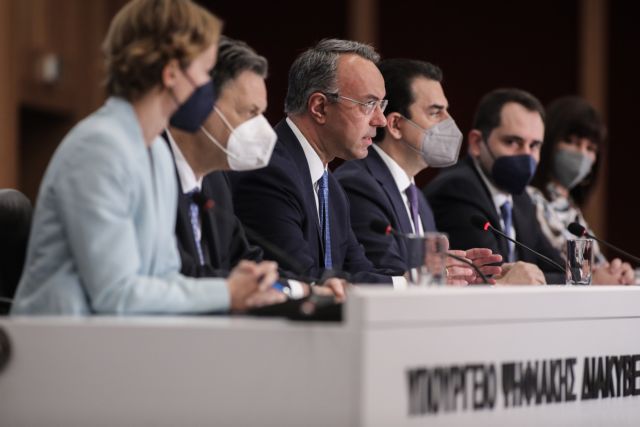
The Minister of Finance, Christos Staikouras, referred to the new package of measures to reduce the cost of electricity, emphasizing that “the crisis has greatly burdened the growth dynamics of the country and that is why the government is moving responsibly, prudently and in a structured way.”
“Greece is suffering from the adverse consequences of a geopolitical and energy crisis, a crisis that is eroding the disposable income of households and restricts business turnover, while also slowing down the growth dynamics of the country,” said Minister Staikouras, referring to government focus.
What the measures provide
As Mr. Staikoura pointed out, first: the electricity subsidy for May and June, is significantly strengthened and expanded. Subsidies of existing categories and consumptions of households and businesses are increased and consumptions over 300 kilowatt hours of the main residence and other household properties are subsidized for the first time. The cost is 900 million euros
Second: In June, 60% of the increase is subsidized for all electricity bills charged to consumers and issued from December 21 to May 22. This concerns household consumers for charges of their main residence that are not covered by the discounts issued through the electricity bills. The grant will be deposited in the declared IBAN accounts. It covers 90% of households. It can not exceed 600 euros per consumer. The cost is estimated at 280 million euros.
Third: The selling price of diesel fuel for the months of May and June continues to be subsidized at the source so that the benefit in the final price for the consumer continues to stand at 15 cents per liter. The cost of the measure is estimated at 45m euros.
Fourth: from July 2022 and for one year, the mechanism of discounts on electricity bills is strengthened across the board in order to stabilize retail prices. A mechanism for absorbing the extra income of producers in the wholesale market is being introduced. At the same time, the subsidy rate in the retail market will be adjusted on a monthly basis, strengthening the current mechanisms of discounts on bills so that prices on average remain stable at certain levels. The aim is for retail prices to remain stable at much lower levels regardless of the evolution of gas prices. The cost of the intervention is expected to be around 2 billion euros in the second half of the year.
According to Mr. Staikouras, the interventions will absorb 70% – 80% of the cost increase while the total of the interventions reaches 3.2 billion euros for the rest of the year, while 1.12 billion euros is the cost for the budget.
The axes
For his part, the Minister of Environment and Energy, Costas Skrekas, stated that “since the beginning of the war, there have been successive records of high prices for oil, gas and electricity”, while he added that “the flow of natural gas from Russia to “Poland and Bulgaria in recent days have raised serious concerns about security of supply.”
The government, according to the Minister of Environment, has moved on two axes: first, in measures to support the rise in energy prices and second, in the plan to address the most unfavorable scenarios of disruption of gas flows to Greece.
Mr. Skrekas spoke about a model of drastic intervention in the energy market:
May – June subsidies
In May and June, subsidies on electricity and gas bills on household and business bills will continue.
Electricity – Household consumers
The subsidy covers all dwellings, main residences and other domiciles, without income criteria and for the whole of consumption.
Particularly:
As concerns main residences, for the first 300 kWh the state will absorb 86% of the increase in electricity costs, as the average aid will amount to 56.6 euros per month.
For the first 150 kWh the subsidy is set at 205 euros / MWh.
For monthly consumption from 151 to 300 kWh to 160 euros / MWh.
For the total consumption over 300 kWh per month the amount of the subsidy amounts to 100 euros / MWh.
For all non-main residences, the state will subsidize the total consumption with 100 euros / MWh in order to absorb 50% of the increase.
For the beneficiaries of the Social Household Billing, the subsidy will amount to 215 euros / MWh for total consumption, with the aim of absorbing 100% of the increases.
The total amount of the subsidy for household consumers in May will amount to 200 million euros. The June grant will be announced at the end of May.
With these interventions all households will see a significant reduction in their bills.
Some examples for the month of May:
Households with consumption of 300 kWh per month. Without a subsidy they would pay 100 euros for electricity and with a subsidy of 43.5 euros – they will see a 56.5% discount on the energy bill.
Households with consumption of 400 kWh per month. Without subsidy they would pay 129.2 euros, and will now get a subsidy of 63.6 euros – 51% discount.
For consumption of 600 kWh, consumers will pay with the subsidy 108.2 euros while without subsidy they would have paid 193.8 euros – 44% discount.
Electricity – Subsidy on professional bills
For business consumers, the unit price of the subsidy is set at 120 euros per MWh in May for total consumption.
In addition, for small and medium-sized enterprises with power consumption of up to 35kVA and for all bakeries regardless of power supply, we increase the subsidy for total consumption with an additional subsidy of 50 euros / MWh. So the total unit subsidy amounts to 170 for May.
With this measure, we subsidize 80% of the adjustment clause. It concerns 1,250,000 million professional services of companies such as: restaurants, shops, kiosks, haberdashery, hairdressers, offices, bakeries and is estimated at 35 million euros for April.
In total, in May the total subsidy for professional invoices amounts to 260 million euros.
Natural Gas – Subsidy on Household Bills
The state subsidy will amount to 20 euros per thermal MWh in May for all households and for the total monthly consumption.
At the same time, DEPA Commerce continues to offer a discount for the same period of 20 euros per thermal MWh.
Natural Gas – Subsidy on NON-Household (Commercial-Industrial) Bills
We continue to subsidize gas bills for the next two months to all commercial and industrial consumers regardless of size, turnover and number of employees.
The subsidy will amount to 20 euros per thermal MWh for total monthly consumption.
The total amount of the subsidy from the Government for household and professional gas consumers will amount to 20 million euros in May.
For the next two months, we will take total measures for electricity and gas that are expected to amount to up to 1 billion euros.
What will take effect from July
From the 1st of July we proceed to a drastic institutional intervention in the energy market. Specifically, we apply a new compensation mechanism for power plants based on their actual operating costs and thus are disconnected from the wholesale energy price that to date is affected by the international gas price.
In this way we recover the total overpayments of electricity producers and the special account of RES which by year’s end is estimated at 1.630 billion euros. In total, together with the subsidies from the Budget and the Energy Transition Fund, in the next six months, the total financial support for electricity bills will approach 3.2 billion euros.
Also, since with the measures we are taking we stabilize and disconnect the wholesale purchase price from the limit value of the system, with a ministerial decision we suspend the adjustment clause for the entire period of operation of the new mechanism.
Preliminary discussions on the institutional change with the European Commission’s Director General for Energy have already begun and the notification of the new institutional intervention will be officially sent next week.
Overall, with the new measures we absorb:
For Vulnerable families, concerning about 500,000 households: 100% of the increase.
In all Household bills (all dwellings): absorption up to 85% of the increase.
In 1,250,000 SMEs 82% of the increase.
90-95% of the increase to farmers and agricultural bills
Latest News

Mitsotakis Unveils €1 Billion Plan for Housing, Pensioners, Public investments
Greek Prime Minister Kyriakos Mitsotakis has announced a new set of economic support measures, worth 1 billion euros, aiming to provide financial relief to citizens.

Alter Ego Ventures Invests in Pioneering Gaming Company ‘Couch Heroes’
Alter Ego Ventures' participation in the share capital of Couch Heroes marks yet another investment by the Alter Ego Media Group in innovative companies with a focus on technology.

Corruption Still Plagues Greece’s Driving Tests
While traffic accidents continue to claim lives on Greek roads daily, irregularities and under-the-table dealings in the training and testing of new drivers remain disturbingly widespread

Pope Francis Died of Stroke and Heart Failure Vatican Confirms
As news of the official cause of death spread, tributes poured in from across the globe. The 1.4 billion-member Catholic Church is united in grief, remembering a pope who championed inclusion, justice, and compassion

Increase in Both Museum Visits, Revenues for 2024
As expected, the Acropolis was the top archeological site in the country, followed by Sounion, Mycenae, the ancient theater of Epidaurus, and Vergina in northern Greece

Where Greece’s Tourists Come From: A Look at 2025’s Top Visitor Markets
The United Kingdom continues to hold the top spot as the largest source of incoming tourism, with 5.6 million seats booked for Greece this summer — up 2.2% from last year. This accounts for 20% of all international air traffic to Greece

Pope Francis: A Pontiff Who Reshaped the Papacy and Sparked a Global Conversation
His first words from the balcony of St. Peter’s Basilica—“Brothers and sisters, good evening”—set the tone for a pontificate that would challenge norms, favor mercy over dogma, and bring the papacy closer to the people.

When Blue Skies was Unmasked as ND’s Political ‘Slush Fund’
The fact that so many top New Democracy (ND) party cadres were paid by the firm Blue Skies, owned by Thomas Varvitsiotis and Yiannis Olympios, without ever citing this publicly, raises very serious moral issues, regardless of the legality

Greek Women’s Water Polo Team Top in the World after 13-9 Win Over Hungary
The Greek team had previously defeated another tournament favorite, the Netherlands, to reach the final.

S&P Raises Greek Rating; BBB with Stable Outlook
S&P’s decision raises the Greek economy to the second notch of investment grade ladder, at BBB with a stable outlook.











![Πλημμύρες: Σημειώθηκαν σε επίπεδα ρεκόρ στην Ευρώπη το 2024 [γράφημα]](https://www.ot.gr/wp-content/uploads/2025/04/FLOOD_HUNGRY-90x90.jpg)




![Ξενοδοχεία: Μεγάλο το ενδιαφέρον για επενδύσεις στην Ελλάδα – Η θέση της Αθήνας [γραφήματα]](https://www.ot.gr/wp-content/uploads/2025/03/Athens-hotels-90x90.jpg)
























 Αριθμός Πιστοποίησης
Αριθμός Πιστοποίησης